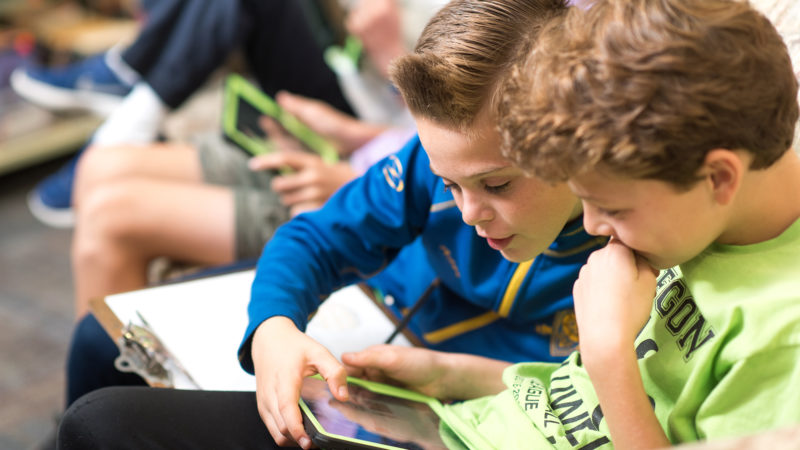Apps, Gadgets, and Games for the Holidays
Need a great gift that inspires learning and creativity?
Waynflete Lower School teacher Tim Hebda has put together a list of apps, gadgets, and games to keep your child excited and engaged during the holidays!
Ideas for Preschool through Grade 5:
Apps
- Alien Assignment: an app for younger learners that encourages problem solving and family interaction. Help the Gloop family fix their spaceship by taking photos of objects that might help solve specific problems. Children hand the device to a family member to review—a great opportunity talk with kids about their thinking.
- Mekorama: guide a robot through stunning block-style mazes and structures. Critical thinking skills are stretched as children take risks to try out possible solutions and learn from mistakes. Puzzles can be built and shared, -supporting creativity and planning.
- Everything Machine: a blank canvas with a toolbox filled with parts that fit together to create virtual electronic devices. Trial and error and tinkering through a drag-and-drop process easily links pieces to create and problem solve. (Explore the many other great apps created by Tinybop.)
- Bloxels Builder: create your own video game using blocks and endless imagination. Similar to the first Mario Brothers!
- LightBot and Lightbot, Jr.: great computational thinking application that lays the groundwork for coding. Send a simple program to a small robot so it can maneuver around a simple layout and turn on its light bulb.
Programs
- Brain Chase: solve a computer-based mystery by gathering clues from videos after completing tutorials in specific subject areas. Engaging and powerful.
- codeSpark Academy – Snoopy Snow Brawl: interactive multi-player gaming experience that teaches computing and coding with the Peanuts gang. The holiday-themed environment encourages kids to use problem solving skills, strategy, and algorithms to manage a snowball fight. This program will be released during code.org’s Hour of Code on December 4 and will be available until January 15 on the codeSpark Academy app and website.
- Minecraft: players use textured cubes to build a 3D world. Math mazes, dream houses, animal models, and more are all possible!
- Scratch: computer code is presented as puzzle pieces. Older students use code to program sprites to create presentations, skits, art, and stories. A large online community is available for shared learning. Scratch Jr., is available for younger learners.
Gadgets
- Legos: always and every day!
- Lego Chain Reaction: a Lego extensions that allows kids to build machines à la Rube Goldberg.
- Little Bits: focuses on inventor-based learning. Electronic building blocks that are color-coded, magnetic, and reusable allow everyone to create inventions large and small.
- Magformers: a variety of magnetic building blocks that allow for 2D and 3D construction
- Circuit Cubes: electronic building blocks add sound, motion, and light to Lego creations, traditional toys, or even toothpick construction.
- Sphero: students create code on an app that connects wirelessly to a ball. The ball follows the code directions.
- Tinker Crate/Kiwi Crate: monthly subscription includes a box with all the parts needed to build something cool (waterwheel, stomp rocket, etc.). Booklets, directions, and extension activities are also included.
Games
- Elementos: based on the rock/paper/scissors concept. Use three elements (fire, water, tree) to create an exciting head-to-head challenge.
- Spot It: a simple game for all ages. Features 55 circular cards, each decorated with eight symbols of different sizes. Try to be the first to spot the one symbol in common between two or more cards. It’s not as simple as it sounds!
- Qwirkle: forward-thinking strategy game. Uses attributes to build lines across the board.
- Latice: a strategy game where players match tiles by color and shape. Players begin to plan future moves as they become more comfortable with the game. Easy enough for young players and engaging enough for adults.
- Code Monkey Island: a board game that teaches the basics of programming. Playing cards guide movements through conditional statements. Basic vocabulary and strategic thinking help develop the logic of coding.
- Robot Turtles: learn the basics of coding and computational thinking by laying out playing cards that move turtle game pieces so they can reach gems. Great family game with adults providing the sound effects!
- Gravity Maze: try to arrange ramps hidden inside of towers to move a marble from start to finish. Plenty of fun-filled trial and error.




